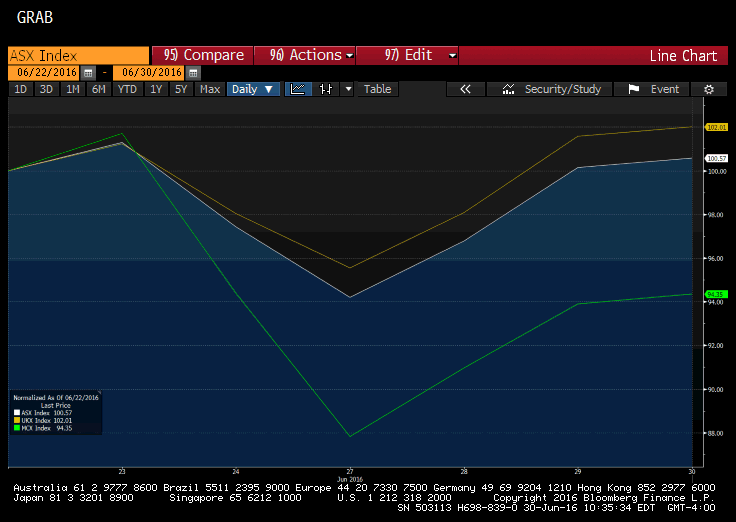Some observers argue the media and some economists are exaggerating the impact of the UK vote a week ago. They talk about the petition for a second referendum. They about Scotland vetoing the decision to leave the EU. They talk about the UK never invoking Article 50 and rehash all the ways the EU has subverted the popular in recent years.

These deniers note how well UK assets have actually performed. UK gilt yields are at record lows despite the two-notch downgrade by S&P as it took away the UK's AAA status, and the single step downgrade by Fitch. All three major rating agencies have negative outlooks on their ratings of the UK. The FTSE 100 is up nearly 2% since the referendum and is the only major bourse that is higher. So what that sterling sold off? It was sharp but only lasted two days. Despite the slightly heavier tone today, it began the day three-four cents above the week's lows.
This is simply cherry-picking. Almost three-quarters of the FTSE 100 revenue come from abroad. Its relative outperformance is a currency play and a bearish assessment of sterling at that. The FTSE 250 is off around 5.5%, which is on par with the markdown of other major European bourses post-referendum.
The Great Graphic is from Bloomberg, and it shows three different measures of the UK stock market. The white line is an all-stocks index. It is up fractionally. The green line is the FTSE 250, which is composed of small and medium-sized business. Their focus is on the domestic market. The yellow line is the FTSE 100.
The rally in UK bonds has indeed been impressive. The 10-year yield is off 44 bp, and the 2-year yield has dropped 34 bp. The problem is that what is driving the rally are expectations that the UK is headed for a recession and that the Bank of England will be easing monetary policy. BOE Carney confirmed this on Thursday.
The speed that sterling came off on Carney's comments lends credence to our suspicions that the lows for sterling are not in place. The large current account deficit, which was also confirmed Thursday, requires capital inflows to offset. Under floating exchange rates and capital mobility, the UK will get the funds, and what is being negotiated is the price.
There can be no mistake. Even without invoking Article 50, the UK has already lost influence, and influence is power. Moreover, it will continue to pay (not as much as the Brexit advocates claimed) for the EU. The UK economy is 10% smaller than it was a week ago, measured in US dollars, about 7.5% smaller in euro terms, and nearly 9% smaller when calculated in Chinese yuan. And the same is true of its market cap.
